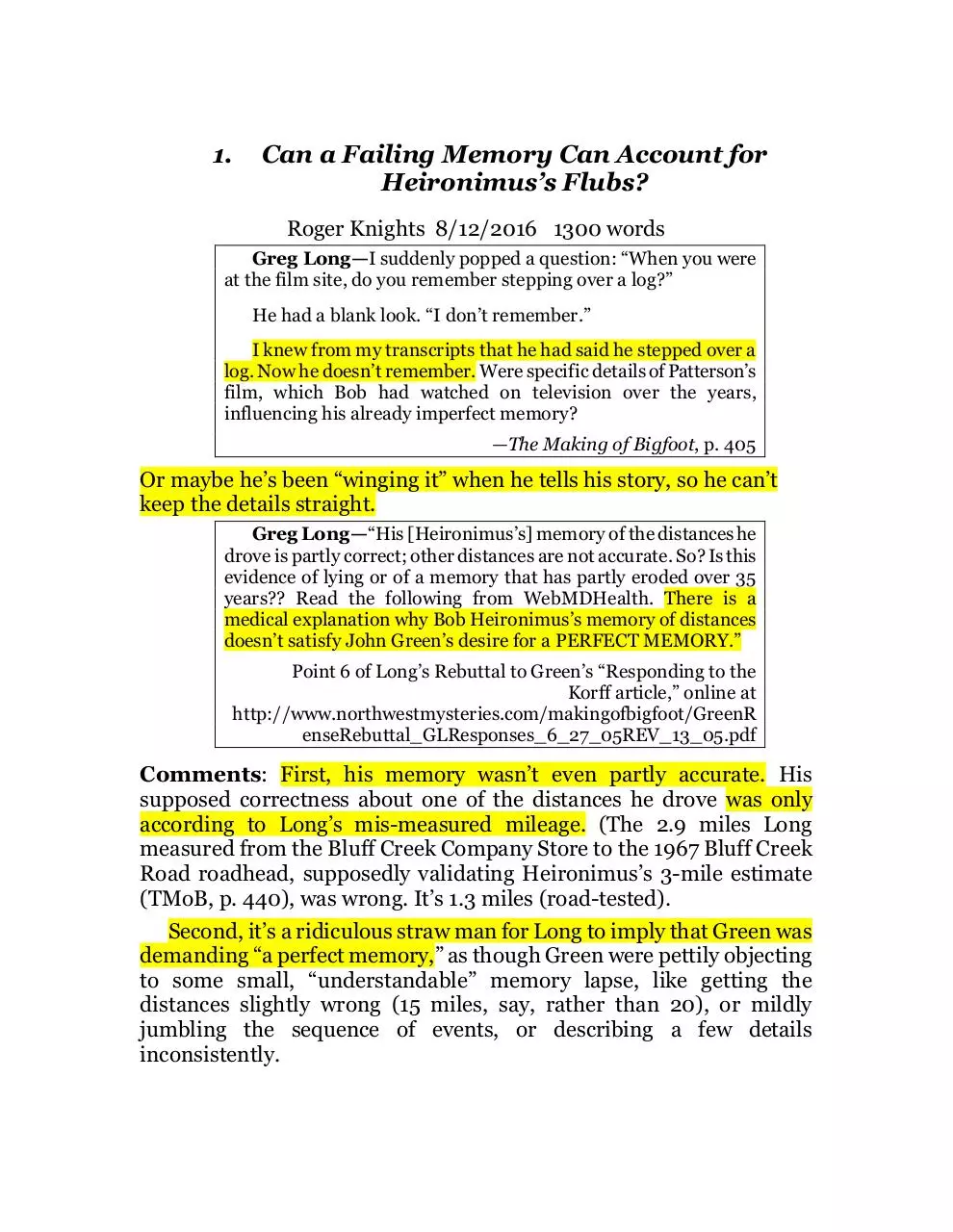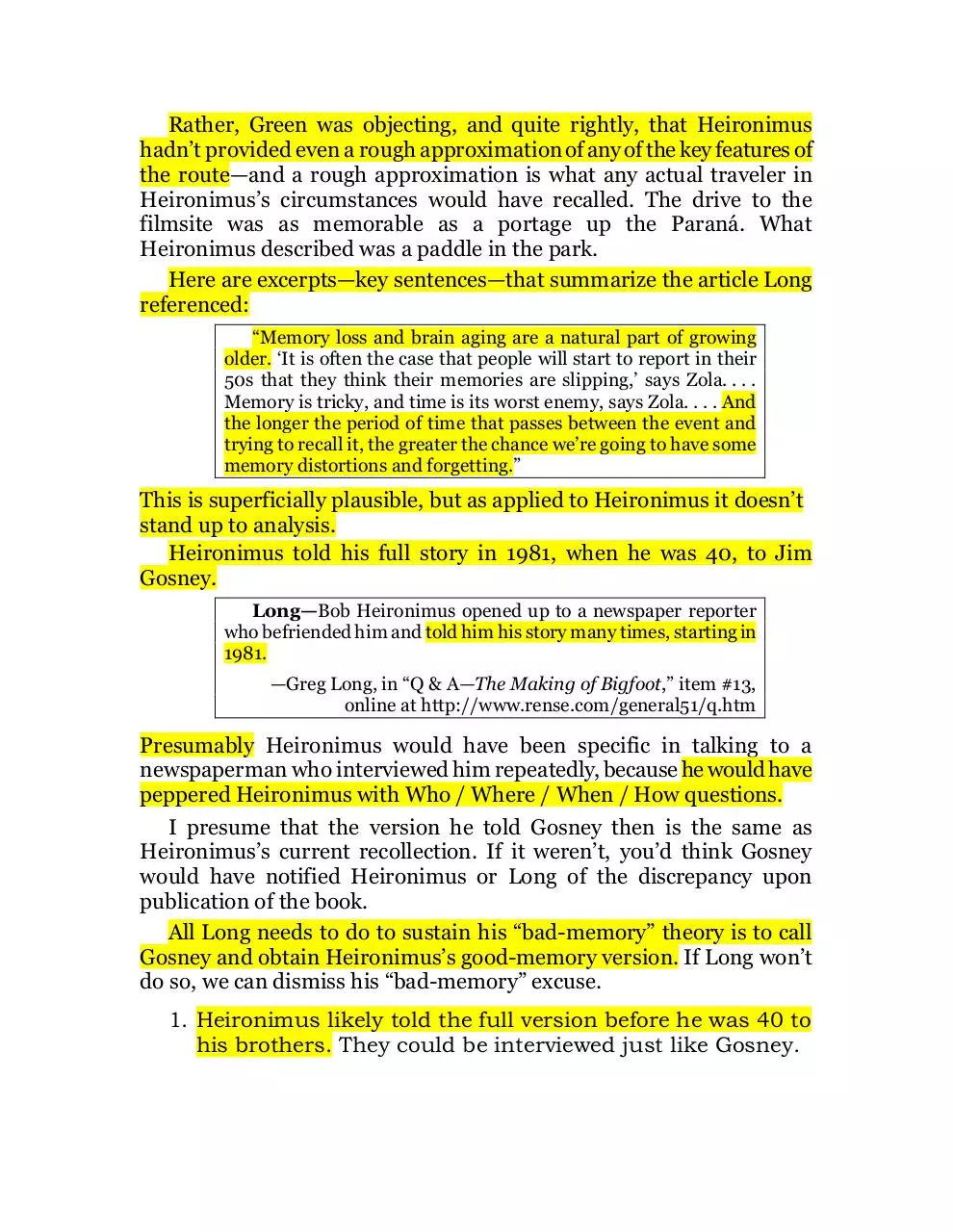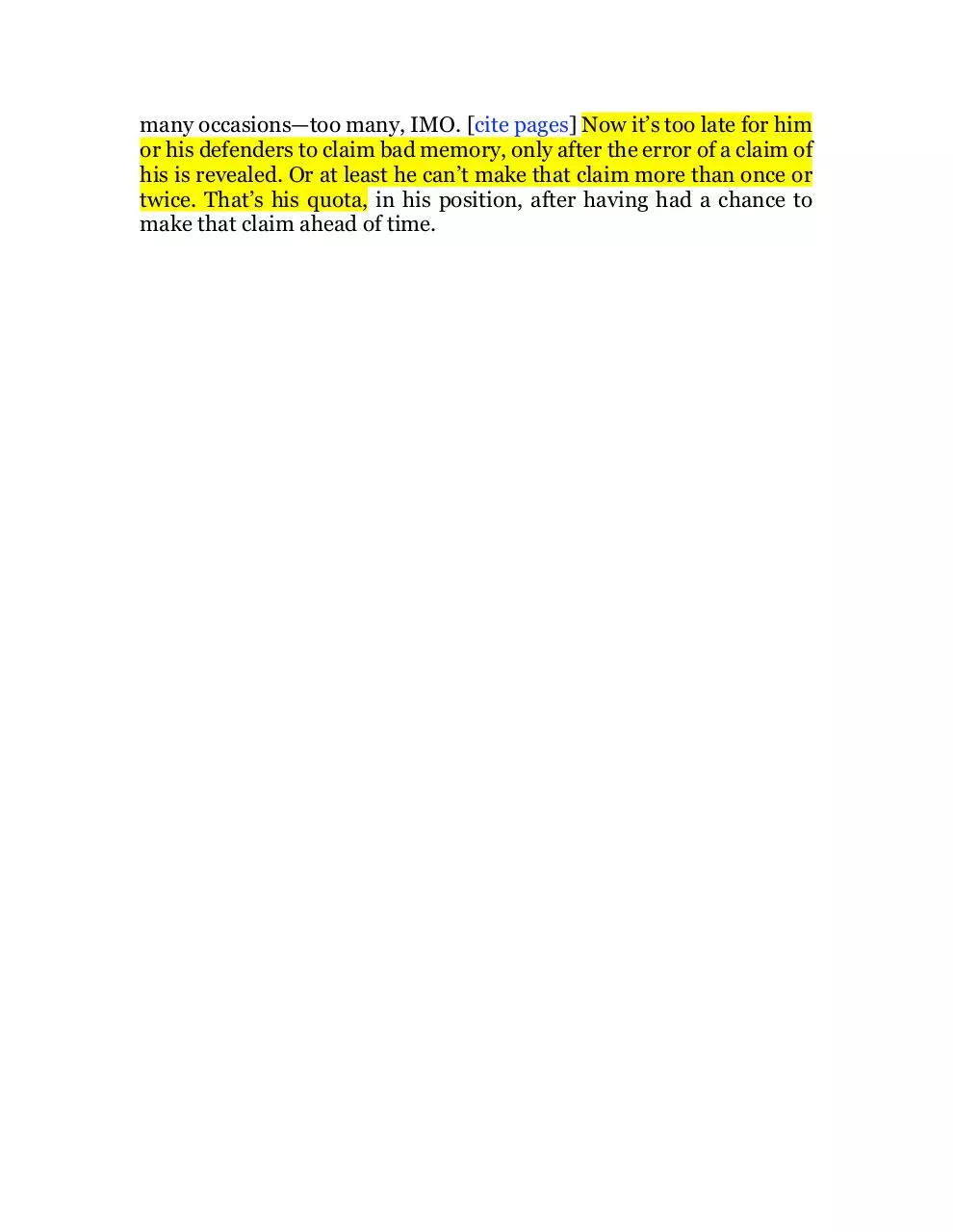Item Can a failing memory account for flubs (PDF)
File information
Title: Microsoft Word - Item-Can a failing memory account for flubs?.doc
Author: Roger Knights
This PDF 1.3 document has been generated by Word / Mac OS X 10.4.11 Quartz PDFContext, and has been sent on pdf-archive.com on 12/08/2016 at 20:00, from IP address 98.232.x.x.
The current document download page has been viewed 497 times.
File size: 115.07 KB (5 pages).
Privacy: public file





File preview
1.
Can a Failing Memory Can Account for
Heironimus’s Flubs?
Roger Knights 8/12/2016 1300 words
Greg Long—I suddenly popped a question: “When you were
at the film site, do you remember stepping over a log?”
He had a blank look. “I don’t remember.”
I knew from my transcripts that he had said he stepped over a
log. Now he doesn’t remember. Were specific details of Patterson’s
film, which Bob had watched on television over the years,
influencing his already imperfect memory?
—The Making of Bigfoot, p. 405
Or maybe he’s been “winging it” when he tells his story, so he can’t
keep the details straight.
Greg Long—“His [Heironimus’s] memory of the distances he
drove is partly correct; other distances are not accurate. So? Is this
evidence of lying or of a memory that has partly eroded over 35
years?? Read the following from WebMDHealth. There is a
medical explanation why Bob Heironimus’s memory of distances
doesn’t satisfy John Green’s desire for a PERFECT MEMORY.”
Point 6 of Long’s Rebuttal to Green’s “Responding to the
Korff article,” online at
http://www.northwestmysteries.com/makingofbigfoot/GreenR
enseRebuttal_GLResponses_6_27_05REV_13_05.pdf
Comments: First, his memory wasn’t even partly accurate. His
supposed correctness about one of the distances he drove was only
according to Long’s mis-measured mileage. (The 2.9 miles Long
measured from the Bluff Creek Company Store to the 1967 Bluff Creek
Road roadhead, supposedly validating Heironimus’s 3-mile estimate
(TMoB, p. 440), was wrong. It’s 1.3 miles (road-tested).
Second, it’s a ridiculous straw man for Long to imply that Green was
demanding “a perfect memory,” as though Green were pettily objecting
to some small, “understandable” memory lapse, like getting the
distances slightly wrong (15 miles, say, rather than 20), or mildly
jumbling the sequence of events, or describing a few details
inconsistently.
Rather, Green was objecting, and quite rightly, that Heironimus
hadn’t provided even a rough approximation of any of the key features of
the route—and a rough approximation is what any actual traveler in
Heironimus’s circumstances would have recalled. The drive to the
filmsite was as memorable as a portage up the Paraná. What
Heironimus described was a paddle in the park.
Here are excerpts—key sentences—that summarize the article Long
referenced:
“Memory loss and brain aging are a natural part of growing
older. ‘It is often the case that people will start to report in their
50s that they think their memories are slipping,’ says Zola. . . .
Memory is tricky, and time is its worst enemy, says Zola. . . . And
the longer the period of time that passes between the event and
trying to recall it, the greater the chance we’re going to have some
memory distortions and forgetting.”
This is superficially plausible, but as applied to Heironimus it doesn’t
stand up to analysis.
Heironimus told his full story in 1981, when he was 40, to Jim
Gosney.
Long—Bob Heironimus opened up to a newspaper reporter
who befriended him and told him his story many times, starting in
1981.
—Greg Long, in “Q & A—The Making of Bigfoot,” item #13,
online at http://www.rense.com/general51/q.htm
Presumably Heironimus would have been specific in talking to a
newspaperman who interviewed him repeatedly, because he would have
peppered Heironimus with Who / Where / When / How questions.
I presume that the version he told Gosney then is the same as
Heironimus’s current recollection. If it weren’t, you’d think Gosney
would have notified Heironimus or Long of the discrepancy upon
publication of the book.
All Long needs to do to sustain his “bad-memory” theory is to call
Gosney and obtain Heironimus’s good-memory version. If Long won’t
do so, we can dismiss his “bad-memory” excuse.
1. Heironimus likely told the full version before he was 40 to
his brothers. They could be interviewed just like Gosney.
2. This isn’t just a memory of distances, but also of the
hard-to-forget character and driving time of the ride, a
ride moreover that Heironimus made twice—not just
once. Only if Heironimus were completely gaga, which he
isn’t, could he have forgotten it.
3. This isn’t a memory of some mundane, forgettable, and
long-gone event that Heironimus has had to dredge up
out of the mists of his memory banks—the sort of
situation described in Zola’s boldfaced phrase above.
Rather, this was a happening that he’d been turning over
in his mind ever since it first occurred. He regularly had
his memory of the event stimulated by having to field
inquiries as to whether he was the man in the suit.
Also, he’d realized at once the importance of “nailing
things down” with locked-in memories, because he
immediately told the guys at the Idle Hour, “Just look at
this and do not forget what this looks like.” Therefore,
he’d have been likely to similarly tell himself, “Do not
forget what happened.” And, once he had engraved the
details of his itinerary in his mind, he wouldn’t have
gotten most of them so badly wrong later.
4. Unlike most of the people suffering from the affliction
described by Zola, who have an awareness that their
memory is slipping, Heironimus has specifically and
peevishly disclaimed having a foggy memory:
Long—Bob, do you feel your memory has been playing any
tricks on you . . . ?
Heironimus— . . . Basically, I told you it was very simple.
This is what I done. This is what I remember. And that’s the way it
happened. I mean, that’s it.
—The Making of Bigfoot, p. 416
Underlining the point above, Long noted that Heironimus was never
hesitant to claim forgetfulness in other matters (pp. 341, 367 (where he
specifically blamed the passage of time), and 371). For instance:
Long—When I asked him a question he couldn’t answer, he
simply said, ‘I don’t know that,’ or ‘I don’t remember.’
—The Making of Bigfoot, p. 341
That forthrightness eliminates the excuse that pride prevented him from
confessing to having a foggy memory.
5. Forgetfulness, especially forgetfulness of matters one is
aware one is forgetting (as in Heironimus’s case) is
different from misremembering, which Heironimus
heatedly denied being guilty of (i.e., on page 416, quoted
above). He doesn’t sound like he’s “all at sea”
(maundering and misremembering) when he’s making
errors. He sounds like he’s “winging it” and thereby
“losing the plot.”
Notice the last three words in his initial estimate of the
distance to the campsite from the roadhead: “four miles—
maybe five miles” (p. 348). They imply that he was so
acutely aware of the distance that he could estimate it to
within half a mile. His attempt to make it look like he was
really there by being ultra-precise about the mileage
ironically bars anyone from invoking a bad-memory
excuse. His false precision was knowingly phony, given
that his guess was absurdly “short” by 18 miles.
Long—“Bob, do you feel your memory has been playing any
tricks on you. . . ?”
Heironimus—. . . “Basically, I told you it was very simple.
This is what I done. This is what I remember. And that’s the way it
happened. I mean, that’s it.” Irritated, his voice rose. “I don’t know
where I stopped to take a leak at between Yreka and Happy Camp,
California, stuff like that.”
—The Making of Bigfoot, p. 416
This last statement implies that he clearly remembered the major parts
of what happened, which makes the Long-site’s subsequent “bad
memory” defense a tough sell.
Memory experts say that extraordinary events are well recalled. [cite]
Heironimus had his chance to plead “poor memory”: when he talked
to Long & other interviewers—and he did plead poor memory then on
many occasions—too many, IMO. [cite pages] Now it’s too late for him
or his defenders to claim bad memory, only after the error of a claim of
his is revealed. Or at least he can’t make that claim more than once or
twice. That’s his quota, in his position, after having had a chance to
make that claim ahead of time.
Download Item-Can a failing memory account for flubs
Item-Can a failing memory account for flubs.pdf (PDF, 115.07 KB)
Download PDF
Share this file on social networks
Link to this page
Permanent link
Use the permanent link to the download page to share your document on Facebook, Twitter, LinkedIn, or directly with a contact by e-Mail, Messenger, Whatsapp, Line..
Short link
Use the short link to share your document on Twitter or by text message (SMS)
HTML Code
Copy the following HTML code to share your document on a Website or Blog
QR Code to this page

This file has been shared publicly by a user of PDF Archive.
Document ID: 0000413454.